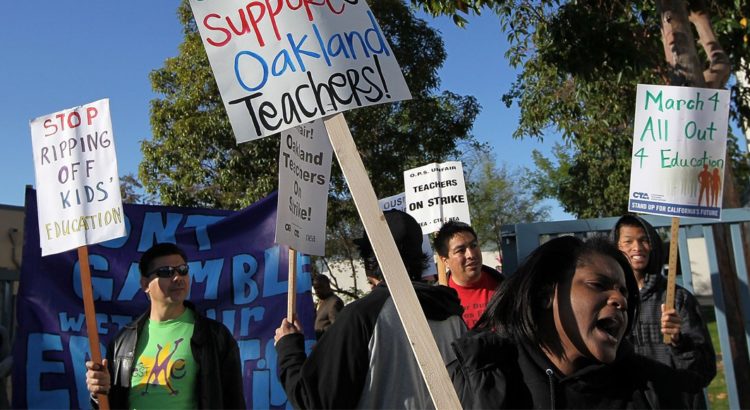United States / April 14, 2018/Socialistworker
Resumen: Las protestas representan la continua urgencia del recrudecimiento que ha convertido a Kentucky en otro sitio de las rebeliones de los maestros que barrieron al oeste de Virginia Occidental a través de estados que anteriormente se consideraban conservadores como «el país Trump»
talked to Kentucky teachers on a visit to the state about how their struggle has developed–and what this weekend’s plans for more protests will bring.
KENTUCKY TEACHERS, education workers and their supporters will gather once again on April 13 and 14 for rallies at the state Capitol in Frankfort.
The protests represent the continuing urgency of the upsurge that has made Kentucky another site of the teachers’ rebellions that swept west from West Virginia through states formerly considered to be conservative «Trump country.»
At the same time, the demonstrations today and tomorrow highlight some of the dynamics and debates that teachers need to consider for the movement to succeed.
At the start of April, an estimated 12,000 teachers and supporters descended on Frankfort, sparked into rebellion specifically by a disastrous attack on public employees’ pensions passed late on March 29 under the camouflage of legislation about sewer construction.
The next morning after this late-night legislative sleight of hand, teachers–led by the grassroots group #KY 120 United–shut down schools in 20 counties through coordinated sick-outs, and many traveled to the capital to send a message to lawmakers.
The tactic of the sick-out was used effectively again on April 2 as politicians considered anti-worker budget and tax legislation. Schools that weren’t closed because of spring break in most of Kentucky’s 120 counties were shut down again, and the turnout in Frankfort was the biggest yet.
Though some educators continued sick-outs or other protests in that first week of April, many looked ahead to April 13–when the legislators’ recess ended and lawmakers would convene again–as the next date for a mobilization.
Developments between April 2 and April 13 highlight the questions that need to be addressed if the movement that shook Kentucky at the start of the month is going to be able to break the stranglehold on public education that is choking teachers, education workers, students and parents.
Above all, the need for a united mobilization of teachers–which was the basis for putting pressure on the legislature last week–is clear.
IN MY trip to Kentucky on April 9 and in conversations over the last two weeks, I’ve had the opportunity to speak with teachers who are in the thick of the struggle, parents and activists who are building solidarity, and supporters who understand its historical impact.
These individuals’ dedication to local organizing and the long-term struggle bodes well for the movement. At the same time, people spoke of the challenges they face–from the actions of politicians and school officials, but also debates within the movement–as they try to continue a struggle that has been months and months in the making.
All this has made for a complicated picture in the period between April 2 and April 13–when work stoppages have been attempted, but not continued; when the politicians have been forced to shift, but have slithered into new positions; and when grassroots groups have been built, but have had to fight hard to stay unified.
As we know from history, no movement or struggle ever develops evenly, going from advance to advance.
The situation in Kentucky is complicated by dynamics that will be familiar from past struggles: debates over what to do next when pressure on lawmakers isn’t enough; discussions about whether or not to strike; the complications of people in different communities with different considerations needing to figure out how they can speak with one voice.
As in all struggles, there’s an ongoing debate about the politics and aims of the movement.
As James Miller, a teacher at duPont Manual High School in Louisville said, some people are fighting only to stop the attack on teachers’ pensions or head off measures to undermine public education–whereas others, including himself, want:
to seize this opportunity to demand significant improvements to public education instead of merely defending the status quo. We want to protect our students by demanding the elimination of legislation that would further criminalize Black and Brown youth and an end to zero-tolerance policies. We want to protect our students’ families by opposing regressive sales taxes and flat taxes.
More than 3,000 people have signed a petition created by Miller that ties the fight for schools to the larger struggle for social justice.
Teachers of all views are still in motion to put forward their grievances–and they know they have the support of many people around them.
Krystal Spencer, with Save Our Schools Kentucky and one of the organizers of the rallies on April 13 and 14, says she’s confident that the rallies will be big, «hopefully bigger than [April 2].»
Citing the many groups that are coming together–including Indivisible, Planned Parenthood, Kentuckians for the Commonwealth, and university groups–Spencer noted how many of these organizations don’t represent teachers, but are participating.
Meanwhile, I heard reports of radicalized teachers who are calling off work this Friday and sending delegations to Frankfort–while working patiently with local groups in their schools who aren’t ready for a strike and have never heard the word «wildcat,» but remain very curious about the strategy.
THE LEGISLATIVE details in Kentucky are complicated, but they are important for understanding the strategic obstacles that teachers have to face.
Even as protesters were leaving the statehouse after their biggest demonstration on April 2, the Republican-led legislature passed a budget bill and a tax «reform» bill that are anti-worker and anti-poor. Yet the GOP claims the balance between the two would benefit education.
The legislature put these bills on the desk of Gov. Matt Bevin, a Tea Party favorite, and then left for a short recess until April 13.
Several teachers’ groups aimed to continue the momentum generated by April 2, with calling sick-outs, grassroots food drives and marching through their towns. But the Kentucky Education Association (KEA) send out a memo to members saying that the union didn’t support work stoppages at this time, and everyone should look to April 13.
On April 6, for example, the union issued a statement that, unfortunately, echoes some of the rhetoric that education bosses use against all teachers’ strikes: «Our students need us to show up for them in classrooms and schools. We urge educators statewide not to allow our united efforts to be compromised by continued calls for action that deprive students, parents and communities of the educational services we provide.»
Meanwhile, between April 2 and April 13, crafty Republican politicians and their ruling-class masters were busy creating a lose-lose situation for those seeking a legislative solution to the attack on education and the social crises in Kentucky–while adding lots of confusion to the process.
On April 9, Bevin vetoed the budget and tax bills put forward by his own party, stating that he wants more «comprehensive tax reform» and a «balanced budget»–code words for deeper tax cuts for the wealthy and austerity for the 99 Percent. This set up a challenge to the legislature to try to override the vetoes on April 13 and 14. Bevin signed the pension bill that sparked the teachers’ uprising.
The Democratic minority in the legislature, which has religiously opposed Bevin, supportshis vetoes and will vote against overriding them, on the basis that they are opposed to the budget and tax bills that passed.
On the other hand, the KEA and its affiliates have called for Bevin’s vetoes to be overridden–a de facto defense of the Republican legislature’s bills.
The logic of the position was explained in a statement from the Jefferson County Teachers Association (JCTA), which contended that, while the union «does not agree with some of the regressive ways the revenue bill generates new revenue, but without a revenue bill, Kentucky will lose hundreds of millions of dollars in funding for public education.»
The unions are right that Bevin vetoed these bills from the right, not the left. But it seems problematic to accept the original legislation, which are clearly regressive and harmful in various ways, as a kind of lesser evil.
Indeed, as so many teachers and supporters expressed in face-to-face discussions, what galvanized them to take action is the general and ongoing attack on education in the midst of a deep social crisis in Kentucky–not a dispute between two versions of budget cuts, two versions of tax cuts for the rich, and two versions of tax hikes that hit poor and working people.
EVEN ACTIVISTS who have organized outside the KEA have debated what path to follow in this confusing situation.
Internal discussions within the #KY 120 United this week revealed disagreement about whether or not to call for work stoppages, and whether or not to settle for the legislature’s original budget and tax bills.
Most of the teachers and others I met remained sympathetic to both the KEA and KY 120 United, even if they disagreed with the positions they have taken regarding the legislation.
After Bevin’s open and disparaging attacks on KEA as «a problem,» there was no question about this–even when one teacher defending the KEA against Bevin said she wished they would be «more of a problem.»
Thus, people who are part of KEA, KY 120 United and school-specific groups, many at the same time, are seeking for teachers to figure things out together as part of a longer struggle against a tough set of opponents. Perhaps some of the momentum of April 2 has fallen off, and no one wants to be pushed into choosing between Republican Plan A and Republican Plan B.
Plus, if we look at what teachers and supporters did accomplish in the «in-between» period, it’s clear how powerful the movement is at the grassroots level. With many teachers not being sure about an ongoing strike, a preparation period may have been exactly what was needed.
In Jefferson County–the state’s most populous county that includes Louisville and the surrounding area, there was an attempt to close schools through sick-outs on April 9, though participation wasn’t strong enough to shut down the schools.
In Pike County in eastern Kentucky, along the border with West Virginia, teachers laid out a week of actions leading up to April 13, including pressuring the Chamber of Commerce for supporting the pension bill.
FOR TEACHERS and activists I met from Northern Kentucky and Lexington, the «in between» meant local meetings with activists, talking to parents about the importance of taking action, and working with others to discuss building solidarity.
«Teachers in my building are hungry for info and action in a way they haven’t been before,» said Molly Seifert, a teacher at Beechwood High School in Northern Kentucky. Seifert noted that the organizing meetings she was part of now drew about 10 times more people than KEA meetings months before.
«I’m advocating for ‘the Pike County plan’ for the rest of the week: local action and then Frankfort on Friday,» Seifert said. «I’m also advocating for a long-term group like this that meets regularly and builds on this momentum.»
Laura McMullen, a teacher at Holmes Middle School in Covington, said: «We were ready last week, and we’re still ready.»
McMullen described the impact of the social crisis, especially in poor schools like hers:
Our class sizes are already at cap. So with all of these resources being pulled, and teaching a group of 31-32 kids, how can I ensure that all their needs are getting met, that their IEPs (Independent Education Plans) are being followed…Our school has a very high rate of special needs kids, and our transience rate is very high, with so many kids homeless at any given time.
So when they cut funding for those kids, for after-school programs, for extracurriculars, what are they going to do? We feed kids breakfast, lunch and dinner–where are those kids going to get that? Busing is very expensive–we have no way to bus these students. If the goal isn’t to bankrupt public schools, then I’m not really sure I know what it is.
Rose Curtin, a parent in the Newport Independent Schools system and member of a local School-Based Decision-Making Council and a Family Resource Center board, explained how poorer, non-white schools would be particularly devastated by the legislation being considered:
I’ve served on hiring boards, and I already know how hard it is to hire teachers to come into a high-poverty, urban school where there are a lot of challenges, and I strongly believe that this is meant to target those places first.
Because Fort Thomas schools are not going to have a hard time, with a wealthy tax base and a lot of extra support. They’re not going to struggle to get new teachers the way that I suspect we in Covington and Newport are going to in order to get people to come in, especially if there’s no pensions and they have significant student debt burdens.
THE EFFORTS of Kentucky activists to build solidarity is inspirational–and exactly what will be required to combat a social crisis with no real legislative solution in sight.
In Seifert’s region, KY 120 United made «plans of reaching out to parents in meetings at local libraries,» she said. «For the first time in my 17 years of teaching, activists from Boone County, Kenton County, Dayton Independent, Beechwood and Covington Independent are working together on a project like this.»
Curtin, who is also a member of the Democratic Socialists of America’s Metro Cincinnati and Northern Kentucky branch, heads up the Kentucky Teachers Strike Fund, to organize concrete solidarity should educators decide to walk out.
From the experience of a family member who lost her job after participating in a strike, Rose is aware of «just the amount of work that a work stoppage is [and] the financial and emotional effects that it has.» The fund, organized jointly by four DSA chapters across Kentucky, was formed after consulting with DSA members in West Virginia who had set up a similar fund for a coalition of groups.
Drew Van’t Land, an organizer for the Kentucky Workers League in Lexington, talked about organizing solidarity through helping working-class parents who might have trouble with childcare, and helping to «combat the narrative that their interests are somehow not aligned with those of the teachers.»
Everyone I talked to, even if skeptical about the future given the difficulty of the task before Kentucky teachers, underlined the gains that the struggle had already made.
Geoff Sebesta of the Lexington DSA said that teachers’ self-organization and solidarity had contributed to «the legislature being clearly scared as hell.»
«The floodgates have been opened by what’s happened in West Virginia,» said Drew Gerbel, the sibling of a teacher and an activist in his own right. «The example has been set. Look what power exists in the working class. But I don’t think people realize it 100 percent yet.»
It does take time for people across a whole state and with so many different circumstances and ideas to realize that strength–and there are no guarantees that the teachers will be able to win what they are fighting for.
But with all that remains to be done, something fundamental has already been gained. As Miller said to me:
There are too many unknowns to predict the future….But one thing will not change: Kentucky teachers are angry, and they will not be easily placated.
Already dozens of Kentucky educators have registered to run for state and local offices in campaigns specifically targeting incumbents who voted in favor of the governor’s anti-public education agenda. Already hundreds of Kentucky teachers have repeatedly swarmed the state Capitol in rowdy protests. Already thousands of Kentucky teachers have participated in a wildcat sick-out strike.
The future is unpredictable, but it will belong to us.
Fuente: https://socialistworker.org/2018/04/13/where-will-the-struggle-lead-kentucky-teachers












 Users Today : 47
Users Today : 47 Total Users : 35460350
Total Users : 35460350 Views Today : 68
Views Today : 68 Total views : 3419096
Total views : 3419096